Belcher Family Values
“Bob’s Burgers” is an exception in the world of animated sitcoms: The Belchers actually like each other.
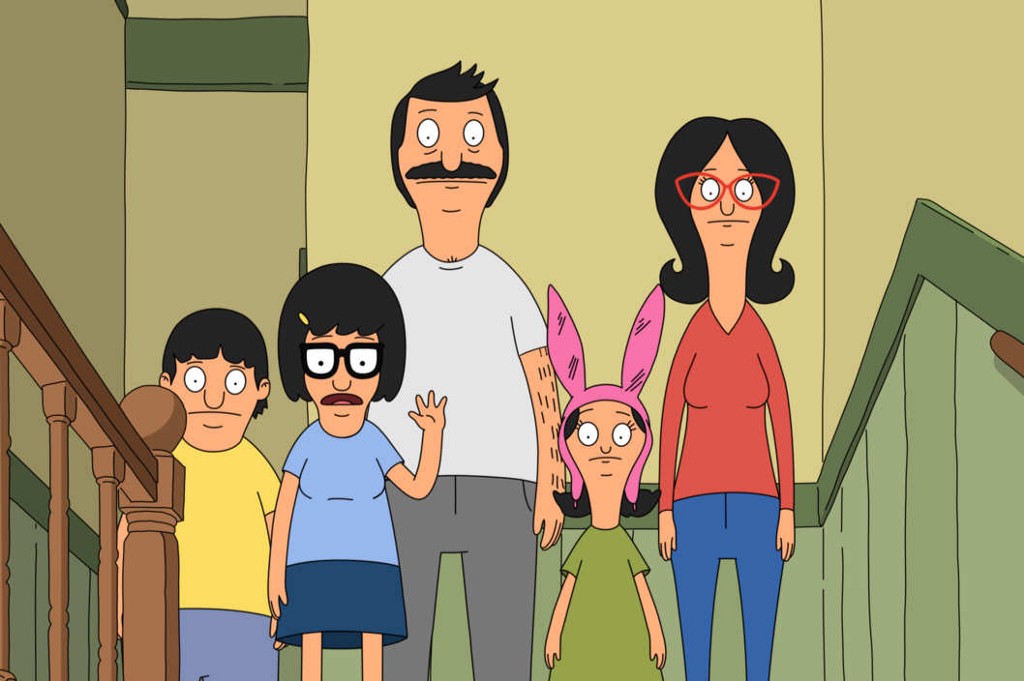
The pantheon of animated family sitcoms isn’t really a happy place. In “South Park,” the kids’ parents are essentially absent, and they live a depraved and vulgar life on the prairie. In “The Simpsons,” Homer is a drunken buffoon, Marge is an enabler, Bart is a borderline juvenile delinquent, Maggie is often forgotten, and Lisa struggles to be a moral person in an often amoral family. In “Family Guy,” Peter and Lois are extreme narcissists and, in Peter’s case, occasionally abusive. Stewie is a Bond villain, Chris is potentially developmentally challenged and receives zero support, and Meg’s character mostly exists to be the butt of jokes. The only real adult in the family is the dog, and he’s a drunk.
“Bob’s Burgers,” which airs on Fox is an exception to the rule of dysfunction. Bob Belcher runs a boardwalk burger joint, which usually loses money. His wife Linda involves herself in other’s people business and devotes herself to raising their three kids, Tina (thirteen, awkward but preternaturally confident) Gene (eleven, goofy, and devoted to becoming a musician), and Louise (nine, a spunky troublemaker in pink rabbit ears). Bob and Linda try to raise good kids, and the kids seek to live up to their expectations. It would be precious except that the kids are super weird — Tina, for instance, writes erotic “friend fiction” about zombies and her school friends getting down — and the restaurant always seems to be on the brink of bankruptcy: The Belchers depend on the patronage of Teddy, a guinea-pig loving handyman and Mort, who owns the mortuary next door, to keep the business afloat.
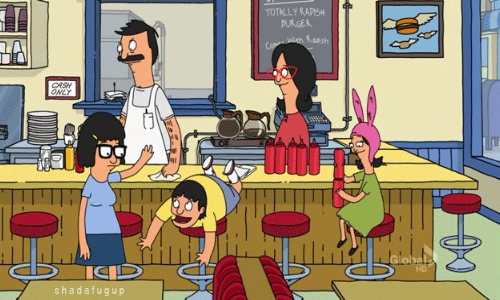
The Belchers’ philosophy about their children is on display in season four, in an episode titled “Gene It On.” The episode opens with Bob wondering who took his mop head. Then Tina walks in carrying it and Gene’s “Rasta Wig” like pom-poms — she’s trying out for the cheerleading squad. Tina is a permanently deadpan hall monitor. If confronted with a socially uncomfortable moment, she groans while making deer-in-the-headlights eyes. But she wants to cheer so she can stand in the “splash zone” from the boy’s wrestling mats. No one in the family knows she’s trying out, since she’s been practicing in the closet.
Bob is understandably worried. “Tina, do you really think you’re the cheerleader type?”
“Bob, be quiet,” says Linda. “Come on, what cheer you gonna do for the tryout?”
Tina limply recites a cheer, “Let’s go. Ignite. The Wagstaff team is dynamite.”
“Okay, we’re ready,” says Linda.
“I just did it,” Tina replies.
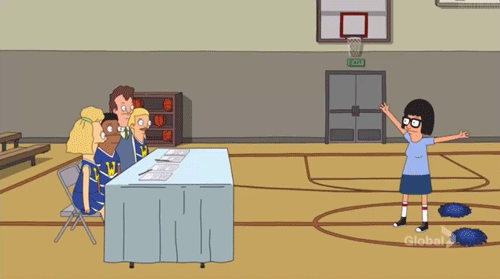
Linda does what any good mother would do: she makes Gene and Louise go to the tryout as well to cheer Tina on. If this were an episode of “Family Guy,” the Griffins would all go to the gymnasium to laugh at Meg. While the initial conceit of the episode is hilarious — that Tina, who is the last person in the world who should be a cheerleader, wants to be a cheerleader so she can be splashed by the sweat of pubescent boys — the core of the plot develops around Gene and his (literally) belly-slapping enthusiasm for his sister. Rather than rely on non-sequitur or coincidence as “Family Guy” or “The Simpsons” would to drive the plot in the same scenario, the episode revolves around a sibling dynamic initiated by Linda’s active parenting.
In season three, episode 7, “Tina-rannosaurus Wrecks,” Bob’s having one of the best days of his life. He’s just bought 6,000 two-ply napkins for $58 — a deal. Tina is with him in the empty parking lot, and Bob gets an idea; he invites Tina to drive the car for the first time.
“Is that legal?” Tina asks.
“Well, no, but my father let me drive when I was about your age. Call it a perk for running errands with your dad,” Bob explains. (Neither the Griffin nor Simpson children have ever willing assisted their parental units in running errands — this is uncharted territory for animated sitcoms, and it allows the humor to derive from Tina’s generalized awkwardness and Bob’s awkwardness in being her father.)
So Tina begins to drive, emitting the glottal groaning noises she makes under duress, and, despite moving at a crawl, somehow manages to crash into the back of the only other car in the lot.
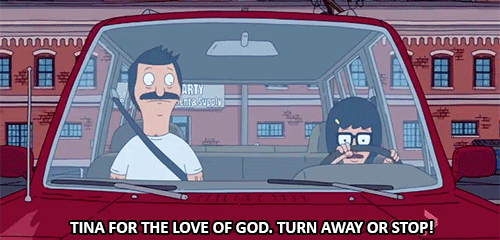
“Oh my god it’s bad,” Bob says, holding his head.
“I ruined the car.” Tina deadpans.
“You did, you really did. Well, okay, uh. At least there doesn’t seem to be any damage to the other car.” Tina freaks out, gesticulating and pointing wildly.
“No, I see a dent. There’s a dent!”
“No, that’s a ding. No even. It’s like a little scratch.”
“No, it’s a dent.”
“Alright, we’ll leave a note!” Bob says. “You know, then again, for all we know, that probably was there.”
“We have to leave a note! We have to leave a note!” Tina yells.
“Okay, okay. You’re so honest… who raised you?” Bob says, beaten.
“I don’t know!” Tina is still upset.
“It was me. I did.”
Bob is dealing with a classic adult problem — he doesn’t want his insurance rates to go up — while also trying to be a good example for his daughter. It’s this tension, between adult desire and what Bob and Linda firmly believe to be their moral duty to be a good example, that precipitates most of “Bob’s Burgers” plots.
In episode 10 of season five, “Late Afternoon in the Garden of Bob and Louise,” the tension between adult desire and the needs of children reaches its peak. Bob wants a plot in the community garden — he mistakenly believes he will find it soothing and spiritually fulfilling — but he has to convince the woman who runs the garden, Cynthia, to give him a plot. So Bob cuts a deal: he gets a garden bed but must take on Cynthia’s son, Logan as an “intern” to provide fodder for his summer camp essay.
Once pea, green bean and tomato sprouts start coming up, Bob breaks into song, “I think I found my happy place.” The plants even start dancing. After Louise and Linda get into a fight with Logan and Cynthia, Bob makes Logan employee of the month so that Cynthia doesn’t take back his garden plot. Eventually, Louise steals Bob’s gardening shears with the intention of destroying Bob’s plants.
Bob, chasing her, blurts out, “Louise, please. Those are my babies!”
She looks at him with big, offended eyes. “What? These are your babies?”
“Yes, those are… oh. Why did I say that in front my actual baby…. Maybe this whole garden thing was maybe a little bit selfish,” Bob says. And he gives her permission to cut down the plants.
A moment later, Bob apologizes for hiring Logan. “I’m sorry I hired Logan. I know how much you don’t like him.”
“Yeah, I’m pretty open about that dad. Plus, I mean, the restaurant is our place and I like it that way.” Bob even asks for Louise’s forgiveness. And she gives it to him (after a bit of negotiating — she wants to fire Logan herself).
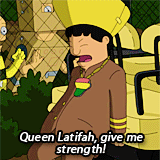
Bob has to play a very active role in Louise and Tina’s lives. Gene, the middle child, often gets overlooked. He’s less neurotic than Tina and less of a troublemaker than Louise. He dresses up as 1990s Queen Latifah for Halloween. There are perennial questions about whether or not he’s gay. The show never tells us, but the strength of the family is apparent in how Bob, Linda and his sisters always accept him for who he is. Linda praises his costume and the whole family goes to the underground school music version of Die Hard that he puts on.
This is the essence of “Bob’s Burgers.” No one is exceptional. The Belchers love each other despite their foibles. “They all have a vulnerability to them, and they all are passionate in different ways,” said Kristen Schall, who voices Louise. And Loren Bouchard, the shows creator, contrasts the show with “South Park.” “I respect the rights of any show, and particularly animated shows, to [be mean] if they want to… if they are particularly good at it. I’m thinking of ‘South Park’…. It’s just not something we were interested in doing.”
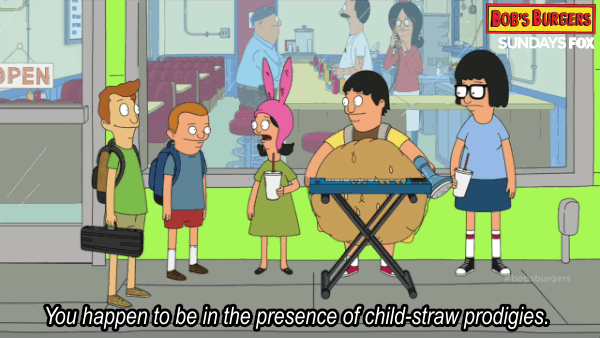
What “Bob’s Burgers” is good at is creating a family of real people who aren’t perfect but who care for each other. The parents actually parent their kids (or are they the titular burgers?) and the kids actually love each other. They try to be decent people. And as viewers, we appreciate that. They might struggle to sell burgers, but the Belchers have each other. And the image of a long-suffering line-cook and his enthusiastic wife trying to turn their kids — including a son who bathes in a vat of beans just to find out how it feels — into well-adjusted adults, is always hilarious.
Benjamin Reeves is a New York-based journalist and editor whose work has appeared in Worth magazine, USA Today, The New York Times, Vice and the Miami Herald. Follow him on twitter at @bpreeves.
